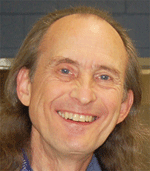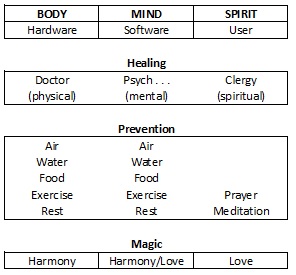In previous issues of Computer Times, we printed a 26-month series from the book titled Get The MOST from Yourself, by Dr. Terry Kibiloski. This is the tenth article of that series.
Summary of the Key Principles
The human system is similar to the personal computer system, with three major parts – the body (hardware), the mind (software), and the spirit, or soul, (user).
We are spirits having a human experience!
To maintain the human system it’s important to understand:
- Body specialists (doctors) help maintain our human body.
- Mind specialists (psychologists) help maintain our human mind.
- Spirit, or soul, specialists (priests, ministers, rabbis, etc.) teach us how to effectively use our body and mind. The ideal teacher is the Creator of our body and mind.
If you can understand the similarity between the computer system and the human system, you are on your way to getting the MOST from yourself. Let’s now look at some important principles.
- As the computer operator uses the hardware and software to have a computing experience, our spirit uses the body and mind to have a human experience
- Our overall health depends upon a harmonious relationship between our body, mind and spirit
- Our human system seeks harmony and ease, not dis-ease
Last month, we gave you a summary of the principles we discussed over the previous months. For new readers, we reprinted some of these principles below.
- We are spirits having a human experience.
Our spirit controls our mind and, in turn, our mind controls our body. This interaction requires a healthy body, mind and spirit for us to get the MOST from ourselves.
Our body is a walking miracle with its complex design and its natural healing ability. It must be in good shape for its natural healing ability to work properly. The five essential elements our body needs for good health are fresh air, good water, nourishing food, adequate exercise, and proper rest.
Thought triggers biological responses in our body. Negative thoughts can cause an ulcer, weaken our system and make us more susceptible to diseases like cancer and heart disease. Positive thoughts strengthen our system and protect us from many diseases, placing our body in a state of ease, not dis-ease. Recent studies suggest our thoughts (motives) can dramatically affect those around us. No words need to be spoken for the feeling to permeate the situation.
All actions begin with a thought. Positive thoughts can generate happiness and health. Negative thoughts can bring stress and disease. Norman Vincent Peale told us to change our thoughts to change our world, and the Bible tells us the mind controlled by the spirit is life and peace (Romans 8:6 NIV). But, you cannot simply think to make it so, you must also “become” what you think about. Webster defines “become” as to undergo change or development.
- Our universe, our business, our family, our human self are all systems, existing through the cooperation of many smaller supporting systems.
- Ralph Waldo Emerson said, “We become what we think about all day long.”
- Norman Vincent Peale taught us to “Change your thoughts and you change your world.”
- The Bible teaches us “The mind controlled by the spirit is life and peace (Rom. 8:6 NIV).”
- We are not human beings having a spiritual experience, we are spiritual beings having a human experience.
- As the computer operator uses the hardware and software to have a computing experience, our spirit uses the body and mind to have a human experience.
- The greatness, the ultimate success, of our human system depends on our spirit, the creator of our thoughts.
- The biggest influence on our life is our thoughts, the way we think.
- There is a direct relationship between sowing positive thoughts and reaping positive rewards.
- You may not do everything you love, but you can still love everything you do.
- Positive thoughts can be applied to all situations and processed into positive feelings, attitudes, and actions.
- YOU control your thoughts.
- You become what you think about all day long.
- You are the sum total of all the choices YOU have made.
- The choices you make are directly linked to the image, the thoughts, you have of yourself.
- First, develop an image of a happy and successful YOU, and then fill your mind with positive, supporting thoughts.
- Happiness and success come from inside, not from outside of you. You are in total control.
- Success is something internal, an attitude, a positive image.
- The primary difference between a highly successful, happy person and someone who has little success and happiness is the way they think.
- Success is not something you get from a job. Success is something you bring to the job.
- “Arriving” people are successful every day of their lives. Success is something they bring to everything they do.
- Success is “arriving” in the present, not “striving” for the future.
- “Striving” involves a lot of effort and energy and leaves you in a state of struggling – a never ending journey, characterized by the disease called “MORE.” “Striving” people always want MORE.
- “Striving” people spend a lot of time chasing external things for their happiness, and blaming external things for their lack of happiness.
- “Arriving” people realize happiness and success are internal, spiritual in nature.
- Inner peace must be found within our own spirit.
- In the best-seller book of the 1970s, Jonathan Livingston Seagull, Jonathan told Fletch “Don’t believe what your eyes are telling you. All they show is limitation. Look with your understanding (your spirit), find out what you already know, and you’ll see the way to fly.”
- Are you finding a common thread flowing through these key principles? One thing you should realize at this time – you already have everything you need to be happy and successful in this human experience.
The best way to apply these principles to make positive changes in your life is to write down all the areas you wish to improve and then start working on them one at a time. Before this will work, though, you MUST have the desire to change. Once you have that, then you are ready to get the MOST from yourself.
Take a few minutes and write down those things you would like to change in your life. Separate them by body, mind, and spirit. Label these three areas
- My Priorities – Body
- My Priorities – Mind
- My Priorities – Spirit.
Once you make your lists, prioritize them. Place a “1” by those things you want to change as soon as possible, and a “5” next to those things that would simply be “nice” to change. Use numbers “2, 3 and 4” to note those that fall somewhere in between your “immediate” desires and those that would be “nice” to change.
Now begin working on just one or two of your number 1 desired changes remembering that a journey is completed one step at a time. Be patient and keep a positive attitude.
Send this to everyone you consider a FRIEND.
Much more next month . . . Get the Most from Yourself – Chapter 10
IMPORTANT NOTICE: This file is protected by copyright laws. It may not be copied or reproduced in any way without the expressed permission from the author, Dr. Terry Kibiloski. Readers who purchase a copy of this file from Computer Times, may make a printed copy for their personal use only.


